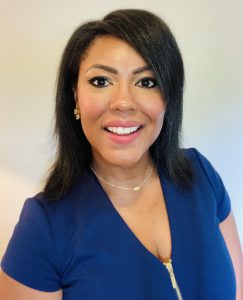
The blog: Author Archives: hwerner
International Eating Disorder Expert Highlight
Let’s not forget about the experts who are widely known in our field but live or work in other countries.
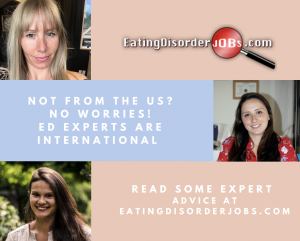
“Imposter Syndrome is very real. It is always good to balance that out with reminding yourself what you know and what you don’t while making sure to stick within your scope of practice. One of the things that has helped me the most is attending webinars, reading books, and just getting my hands on any ED-related material I can. This field is challenging and yet so rewarding. Always keep in mind the nature of eating disorders … Progress in recovery usually has nothing to do with you as a clinician. Sometimes it’s good to remind yourself of that!” – Clair El-Jor MSc, LD (Lebanon)
“If a student wants to get into this area I think you need to be prepared to do a lot of work. Including self work. I have listened to 100s of podcasts, read articles, joined ED FB groups to read and listen to sufferers to understand perspectives on treatment models. You need to learn skills that you don’t get in your RD degree. Working in a team with parents, partners, GP, psychologists – and most of the time you will know more than the rest of the team. You will become skilled in the medical, pharmacology, psychology, nutrition, therapy, exercise and genetics because it’s all so related to the food. You will be versed in the guidelines in all areas to help guide the rest of the treatment team with best practice. And you will be so passionate about it you won’t even care that you don’t get paid for 90% of the work you do.” – Victoria Schonwald RD (New Zealand)
“Be gentle with yourself. I know for myself the drive can be strong to want to fix everyone and take their pain away, and this can create intense and unrealistic pressure on myself (and them!). Focus on what you can control and on being the most caring, authentic, competent provider you can be, and then know that this is also everyone’s own journey. Find ways of loving the work for the connections it allows you to make with amazing individuals and for how neat it is to be able to be a part of their journeys, whatever path it takes.”- Sarah Rzemieniak (Canada)
“ I began working with provincial and national athletes through the Sport Medicine and Science Council Manitoba and then the Royal Winnipeg Ballet. I decided I needed to be part of a larger networking group and became a member and shortly after co-chaired the Dietitians of Canada Sport Nutrition Network. I started to attend conferences such as SCAN, ASCM, Eating Disorders in Sport Conference etc. With continuing education such as the International Olympic Committee Diploma in Sports Nutrition and networking and openness to mentorship, I landed my current full time position with the Canadian Sport Centre Manitoba (CSCM). My work in sport opened my eyes and my heart to the world of dysfunctional eating behaviors and that not one “type” of sport or athlete or human is immune.”- Jorie Janzen CSSD (Canada)
“My best advice to someone new in the field is to build a community of likeminded peers that share your values for the work you do. So much of our clinical work is rooted in developing expertise and learning new ways to treat clients and different modalities, that the learning process can be incredibly isolating. Start with what brings you meaning and value first, and you will never lose sight of your purpose. Bring others along with you who share your visions and work together on making it happen.”– Meghan Watson M.A. RP (Canada)
Check out these experts’ full interviews at https://eatingdisorderjobs.com/category/advice-from-experts/ and search the right column for their name.
Eating Disorder Experts in Academia
A big shout out goes to those eating disorder experts that teach or work in school environments. These experts are much needed for the education of our future experts and the education of collegiate athletes. When asked to give advice to those hoping to enter the field, they said the following:
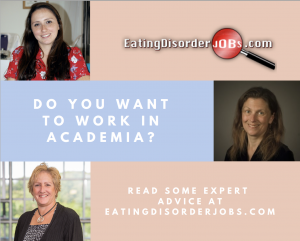
“Be curious and read! Research is the foundation of evidence-based practice. If you learn how to read, think critically, discern and apply research, you are going to be a strong and respected clinician. These are skills learned largely in graduate school. These skills need to be practiced! So read, and read often; discuss research with colleagues; make it part of your commitment to being a lifelong learner. Read books and blogs in the consumer sphere also. Understand the lived experience and the diversity of the lived experience as much as you can. In addition, get as much specialty training as you can through webinars, podcasts, courses, conferences, clinical supervision, etc. Take your first job in an ED treatment center where you have lots of dietitian colleagues and a multidisciplinary treatment team at your side so that you can learn from their wisdom, experience and collaboration. This kind of on-the-job training and supervision is both invaluable and necessary to develop your clinical competence in this challenging niche of practice. Learn to be an effective listener. Your listening (and counseling) skills will endear you to your clients, allow you to build empathy, and cultivate effective and sustainable working relationships with your clients. Above all, practice consistent self-care. This work is demanding and hard but it is also incredibly rewarding.”- Paula Quatromoni DSc, RD
“Imposter Syndrome is very real. It is always good to balance that out with reminding yourself what you know and what you don’t while making sure to stick within your scope of practice. One of the things that has helped me the most is attending webinars, reading books, and just getting my hands on any ED-related material I can. This field is challenging and yet so rewarding. Always keep in mind the nature of eating disorders … progress in recovery usually has nothing to do with you as a clinician. Sometimes it’s good to remind yourself of that!” – Clair El-Jor MSc, LD
“Stay open to a complex and integrative perspective on body image and eating problems—one that explores their spiritual dimensions and that thinks critically about the cultural underpinnings of these problems. This openness will foster an understanding of eating disorders as responses to human suffering that tragically create more suffering. Such an understanding fosters the compassion that is necessary for the process of healing. I urge new professionals in the field of eating disorders to investigate the spiritual needs that obsessions with food and weight thinly veil, and I would encourage them to define “spiritual needs” very broadly (i.e., in non-sectarian terms), including the need for a sense of purpose, love, inspiration, courage, community, agency, and peace.” – Michelle Lelwica Ph.D
“Go for it…while getting training and support. I highly recommend Eating Disorders Boot Camp & Molly Kellogg’s Counseling Intensive, as well as Molly Kellogg’s phone supervision.”– Amy Culp RD, CSSD, LD
Check out these experts’ full interviews at https://eatingdisorderjobs.com/category/advice-from-experts/ and search the right column for their name.
Laurie Dunham
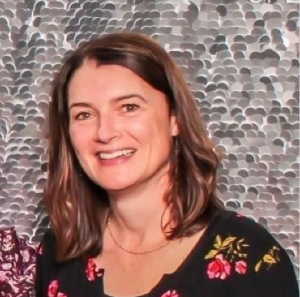
Laurie Dunham, MS, RD, LD, CEDRD-S is the owner of Laurie Dunham Nutrition and an outpatient RD on a multidisciplinary Eating Disorder Treatment team.
What is your current position?
I work on a multidisciplinary Eating Disorder Treatment Team at Cincinnati Children’s Hospital, primarily as an outpatient dietitian. I provide nutrition therapy & education for adolescents & young adults, along with their families, who come to our program at any stage of their eating disorder. Occasionally, I work with the inpatient team on the eating disorder medical stabilization unit. Working in a large teaching hospital, I have many opportunities to educate medical students, residents, fellows, and dietetic interns. I specifically enjoy mentoring RDs who are interested in eating disorders & just learning about health at every size (HAES). This year I started offering Body Positive groups via telehealth and this has been one of the most rewarding experiences I’ve had in my over 20 years as a dietitian.
I also have a private practice, Laurie Dunham Nutrition, where I see adults with all forms of disordered eating. In addition to providing one-on-one nutrition therapy from a HAES lens, I offer Intuitive Eating & Body Acceptance groups. I am passionate about teaching others and spend part of my time in this position supervising & consulting with other RDs who are interested in eating disorders. I love the flexibility and creativity this position offers.
How did you get started in your career?
I started working as an outpatient dietitian at a weight loss clinic (apologies) a few months after my internship ended. Due to random circumstances, I became the nutrition manager of one of the offices. Marketing, training a small number of employees, and other managerial tasks were added to my nutrition counseling responsibilities. I loved the outpatient aspect but quickly realized I was involved in an area that did not align with my values. Less than a year later when a position became available in Adolescent Medicine at Cincinnati Children’s Hospital, I jumped on the opportunity. I was trained by another RD to work with adolescents who had a variety of nutrition needs, including eating disorders. About a year later, an official Eating Disorder Team was formed in our division and, aside from the year I stepped away to stay at home with my kids, I have worked as part of this team in some capacity or another since it began. When I started working at the hospital, I was fortunate that my Division encouraged & funded my attendance at various eating disorder conferences and trainings. I spent much of my spare time reading anything and everything on the topic of eating disorders. I was quickly immersed in a specialty area and I haven’t looked back.
What advice would you give to someone new to the field?
Shadow, observe & talk to dietitians and mental health therapists who are working in the eating disorder field. Ask questions about their day-to-day work; what they love and what they wish they could change. Learn as much as possible by listening to podcasts & webinars, reading books & journal articles, and attending conferences if feasible. Many trainings are now offered virtually which helps keep the cost down; you can share the cost with a colleague if CEUs aren’t an issue. Find a mentor or supervisor to help you with challenging patient/client situations- this is invaluable. Talk to Eating disorder professionals who are in a completely different setting than you may see yourself in. For example, if you think you want to work at the residential level, talk to a researcher and an outpatient dietitian too. The RDs I’ve trained and/or mentored over the years always have one thing in common: passion. When passion is present, the rest will fall into place. You may know immediately that you have a strong desire to help those with eating disorders, but there is a good possibility you may not discover how exactly to use that passion for a number of years to come; be patient. Be open to new ideas and never stop learning!
Learn more about Laurie at:
Kristin Williams
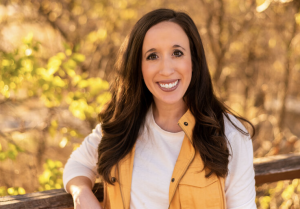
Kristin Williams, RDN, LD, CEDRD owner of Wonderfully Made Nutrition Counseling, works with eating disorders, disordered eating and chronic dieting through a Health at Every Size and Intuitive Eating lens.
What is your current position?
I am a certified eating disorder registered dietitian and I own a private practice in DFW called, Wonderfully Made Nutrition Counseling. I work with adolescents as well as adults, offering in-person and virtual sessions for eating disorders, disordered eating and chronic dieting. I use a Health at Every Size and Intuitive Eating framework while helping clients to heal their relationship with food. I also practice from a faith-based standpoint for clients who are interested in incorporating faith into the treatment of their eating disorder.
How did you get started in your career?
I started my career as a clinical dietitian in the hospital setting. Mentors encouraged me to “get my feet wet” in the hospital setting, though I knew that my passion was in eating disorders early into my career. During this time, I attended as many eating disorder networking and continuing education events as possible in order to add more tools to my toolbox. From there, I went on to work as an outpatient dietitian offering general nutrition counseling. In this position I was able to practice my motivational interviewing and counseling skills while working to build up the referral base for eating disorder clients at that particular clinic. I later transitioned from this position to working in two different eating disorder treatment facilities. While working at a treatment center, I started building a private practice on the side. I later transitioned to solely private practice and I absolutely love it!
What advice would you give to someone new to the field?
I would encourage someone new to the field to apply to their dream job! Don’t feel like you have to wait to get experience to at least apply for the job! I strongly believe that passion precedes performance and, if you are passionate about something, you can be trained and develop a skill set for it. The most intelligent people, if lacking passion for the field, will not do well in the treatment of eating disorders.
I’d also encourage you to get involved in professional organizations within your area to network and learn as much as possible. IFEDD and iaedp are great organizations to look into and both have local chapters.
Continuously learn! Read books, listen to podcasts and shadow mentors. Don’t stop learning. And remember that eating disorders are a tough, yet incredibly rewarding field. You do not have to have it all figured out, just constantly be willing to show up, listen and learn.
To learn more about Kristin:
Instagram: @wonderfullymadenutrition
Website: https://www.wonderfullymadenutritioncounseling.com
Book: Unworthy Weight. It can be purchased under the “shop” tab of my website.
Upcoming event: Body Image Conference for Teen Girls and Women- November 14th 2020 (you can register through the events page of our website or at Kristin’s website)
Malak Saddy
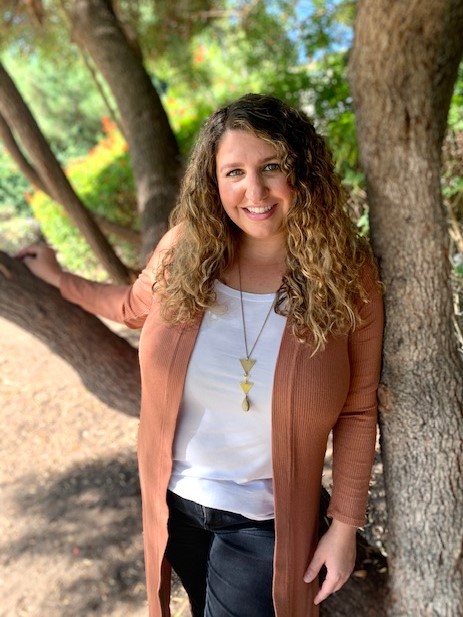

Malak Saddy RD, LD, CEDRD
- What is your current position?
Currently I am in my own private practice in Dallas, TX working with clients who have an eating disorder or wanting to push away from diet culture. I am a Certified Eating Disorder Registered Dietitian (CEDRD), and have been in practice for 9 years in different capacities. I’m also a Body Positive Facilitator, and Intuitive Eating Counselor and strive to incorporating both approaches throughout my sessions, guiding my clients to have a positive relationship with their bodies using a non-diet approach. I am on the board for my local IAEDP chapter and enjoying being able to bring awareness about eating disorders within my community and network with some great colleagues. I present and speak at various mediums bringing awareness about eating disorders and acculturation.
2. How did you get started in your career?
Growing up in an American/Lebanese, Muslim household, food and family were an integral part of our culture. I was always the little girl in the school cafeteria with a small tub of hummus, raw vegetables, and pita slices, or leftover shawarma sandwiches with tons of garlic spread. My food choices always intrigued my friends’ curiosity, and looks of antipathy, while they gobbled their hot dog sandwiches and french fries. I always had to come up with creative descriptions of my lunch, and snack choices. Traveling to Lebanon with my family, during summer breaks to visit our extended family was always so much fun. Food, family outings, and laughter, again brought us all together.
It was later that a family member of mine was diagnosed with ED. I was fascinated by the notion that food also had a negative impact on some. This intrigued my interest more to enter into the field. By the end of my junior year in high school I knew I wanted to become a dietitian. I went to Michigan State University and was able to work with a dietitian who specialized in eating disorders and who ultimately fueled my passion. My first dietitian job was at a mental health facility for adolescents in which I worked with clients with different mental and physical issues including eating disorders, Prader Willi syndrome, Type I and II DM. I loved every second of it, as it was both challenging, and healing. I later went on to work with an eating disorder treatment facility and opened up my practice while I was there 2 ½ years ago. I feel so grateful to have found a career that I truly love.
3. What advice would you give to someone new to the field?
- Network, find professionals in your area and reach out to them. Take them out to coffee, meet with them at their office, volunteer, attend chapter meetings. It’s a good way to see to see what your day to day life could look like and it’s always encouraging to have support and colleagues who share similar values.
- Attend conferences, read books, seek knowledge. There are so many wonderful resources out there, get your hands on them.
- Get a supervisor/mentor. Seeking support from a supervisor/mentor is invaluable and can really help you navigate cases by seeing them from a different perspective. Supervisors can provide a safe place to be able to discuss day to day challenges.
- Make mistakes and learn from them. No one is perfect, mistakes happen and when they do acknowledge them, discuss them in supervision, and move on.
Instagram: @msaddyrd
